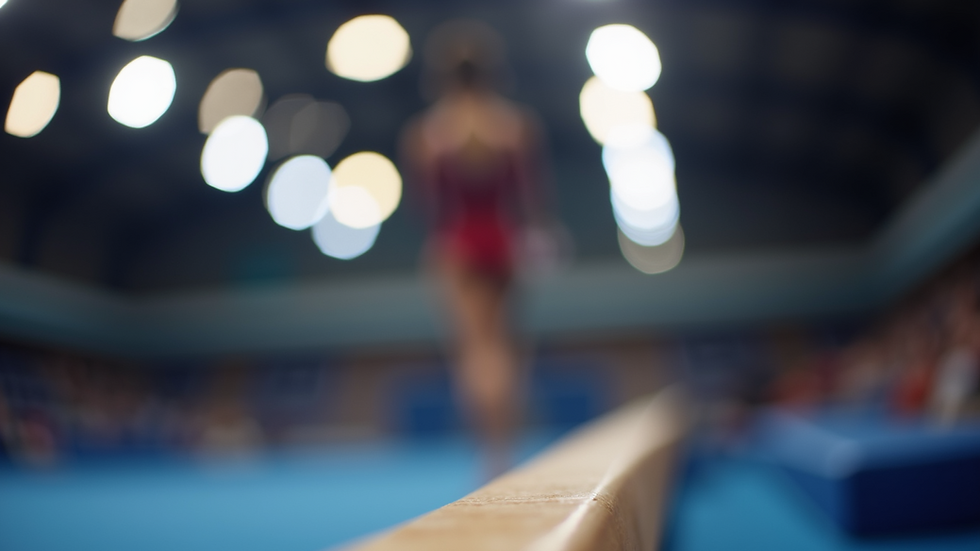Training the Gymnast’s Mind: Confidence, Focus, and Resilience
- Dr Paul McCarthy

- Jul 29, 2025
- 4 min read
Gymnastics is not just about striking poses or executing flips; it is a captivating sport that fuses physical strength with artistry and technical precision. While many focus heavily on physical training, the mental component of performance is equally critical. A strong mindset can be the key to unlocking greater confidence, sharper focus, and enhanced resilience in gymnastics.
This article explores effective mental training techniques for gymnasts. We will highlight how cultivating psychological skills can lead to transformative performances both on and off the mat.
The Importance of a Strong Gymnastics Mindset
A gymnast's mindset lays the groundwork for their athletic success. While mastering physical skills is essential, nurturing mental strength is just as important. A strong mental approach can mean the difference between a stellar performance and succumbing to nerves or mental blocks.
For example, studies show that athletes with strong mental skills are 25% more likely to achieve optimal performance under pressure. This underscores the necessity of mental training. When gymnasts develop mental resilience, they can face fears head-on and tackle challenges with clarity and determination.
Building Confidence in Gymnastics
Confidence in gymnastics is not just a nice-to-have; it is a vital ingredient for success. To build confidence, gymnasts should consistently recognize and celebrate their achievements, no matter how small. This practice can include:
Setting achievable, measurable goals: For instance, aiming to perfect a specific routine over three months.
Celebrating even minor victories: Acknowledging improvements in movement precision or consistency during practice.
Incorporating visualization techniques can also be powerful. When gymnasts visualize executing a routine flawlessly, they reinforce positive beliefs about their abilities.
Creating a supportive environment where gymnasts can push their limits without fear is equally important. Coaches and teammates should emphasize effort over results, assuring gymnasts that progress is the ultimate goal.

Mastering Focus in Gymnastics
Focus acts as a guiding star for gymnasts during training and competition. With distractions everywhere, honing the ability to concentrate becomes essential for success. Some specific techniques to sharpen focus include:
Using mental scripts: Gymnasts can create a set list of mental cues—reminding them of their technique, breathing, and overall flow—before their performance.
Practicing mindfulness: Techniques like deep-breathing exercises can help gymnasts stay present. Research indicates that mindfulness can improve performance by 30%, enabling athletes to tackle challenges with a clear mind.
By training the mind to stay focused, gymnasts can significantly reduce anxiety and elevate their performance levels.
Cultivating Resilience in Gymnastics
Resilience means bouncing back from setbacks and maintaining motivation, especially when faced with adversity. For example, when a gymnast falls during a routine, it is vital how they respond. Building resilience can involve the following strategies:
Positive self-talk: Encouraging statements can help overcome feelings of defeat.
Reframing negative experiences as learning opportunities: Acknowledging that failure is part of growth fosters a growth mindset.
Incorporating gratitude into training can also uplift an athlete’s spirit. When gymnasts embrace both successes and failures as part of their journey, they build resilience and cloud negativity.
Overcoming Fear and Mental Blocks
Fear is a common challenge in gymnastics, often preventing otherwise skilled athletes from performing their best. Acknowledging that fear is a natural response can help gymnasts deal with it constructively. Strategies to overcome fear include:
Gradual exposure: For instance, if a gymnast is afraid of a new skill, they might first break it down into smaller, manageable steps or practice in a secure environment.
Psychological techniques: Methods such as goal-setting and visualization can specifically target fears. Reflecting on past successful performances can help create a positive distinction between fear and capability.

The Role of Coaches and Parents
Coaches and parents play vital roles in developing a strong gymnastics mindset. They must create atmospheres that prioritize mental training as much as physical development. Strategies can include:
Encouraging open communication about challenges and emotions.
Implementing dedicated sessions that focus on mental skills, which can address competition nerves or promote team spirit.
It’s crucial for gymnasts to understand that skills like confidence, focus, and resilience develop over time with sustained practice. Building mental strength is an ongoing journey, requiring dedication and a willingness to improve.
Embracing the Journey of a Gymnast's Mind
Training the gymnast’s mind is as pivotal as training the body. Nurturing confidence, focus, and resilience can facilitate standout performances. When gymnasts step onto the apparatus, they carry with them not just their physical abilities but also the mental tools they need to thrive.
Whether you are a gymnast, coach, or parent, remember that fostering a strong gymnastics mindset can pave the way for remarkable achievements. Embrace this dual journey of mental and physical conditioning, and watch as your efforts in building confidence, focus, and resilience yield extraordinary results.
Ultimately, every small step toward mental training contributes to an athlete’s overall growth. Let today be the day when you prioritize strengthening not just the body but also the mind!







